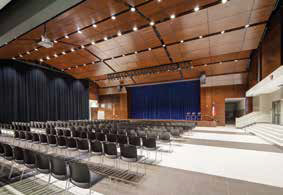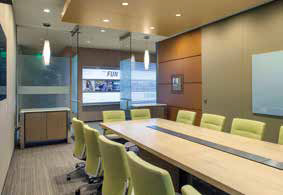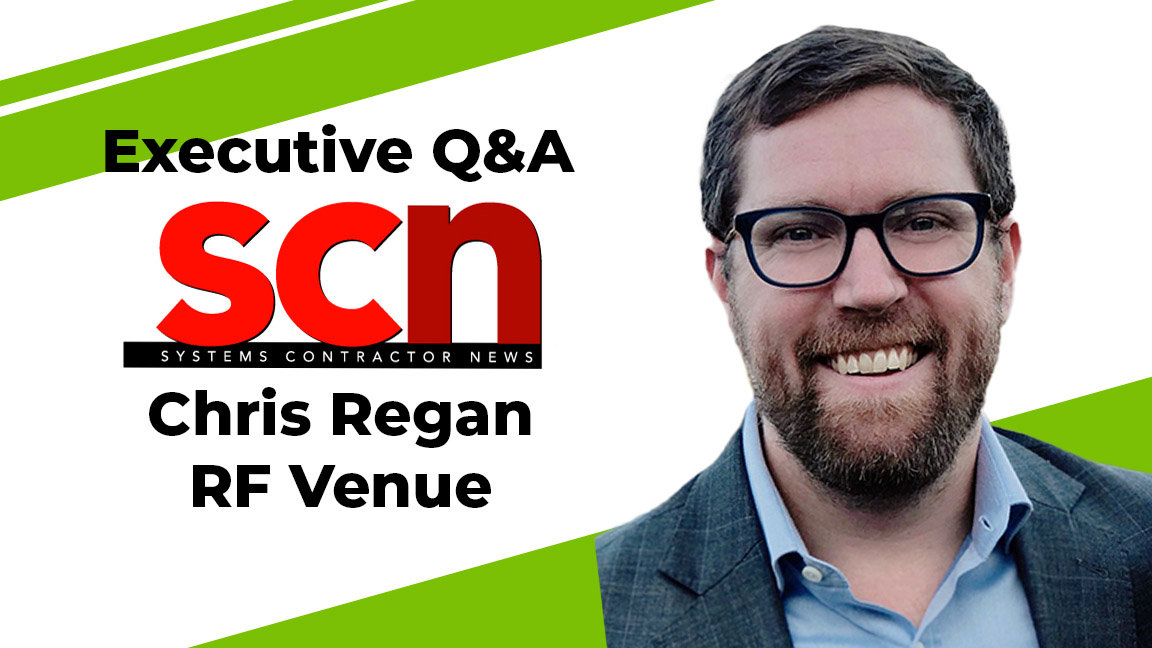Texas Weathers Storms for the Long-Term

A daily selection of features, industry news, and analysis for AV/IT professionals. Sign up below.
You are now subscribed
Your newsletter sign-up was successful
Infinity Sound worked on quite possibly the fanciest “audi-teria” ever built. This gorgeous stage setup with AV design by WJHW is in an actual cafeteria, with the kitchens hidden behind those black curtains during performances. News reports coming from Texas early this summer have hysterically bewailed drought, which was followed by destruction wrought by torrential downpours and gigantic hail, not to mention the odd motorcycle melee or two. But if you talk to those who live and work in Texas, this is just a little bit of extra seasoning in the mix of daily life.
“The rest of the world is always trying to figure out why Texas works,” quipped Chris Jordan, co-owner of Electro Acoustics and Video in Fort Worth, TX. “It’s a great place to live—in spite of the rain and drought and heat,” he laughed.
But he’s not being facetious. For three decades, Chris and his wife Sue Jordan have led an enterprise that occasionally reflects the climatological conditions of the region, but throughout its ups and downs they’ve operated as a cash-based company. No debt for these folks.
In that way and others, Electro Acoustics and many Texas-based AV companies demonstrate the answer to why Texas works.
A quick survey with Jordan at Electro Acoustics, James Beckham, another co-owner of a company with his wife and daughters at Audio-Video Corporation in Amarillo, TX, and Max Curry, head honcho at Infinity Sound in Grand Prairie, TX revealed some common themes for successful enterprise in any sort of meteorological climate.
Fiscal Conservation
A business’ resilience is based on strict adherence to fiscal conservatism and a little bit of planning for the worst, Jordan revealed. “You can’t spend it all and take it home, you have to leave an awful lot of it in the bank ready for the next disaster—hailstorm, rainstorm, drought, economic downturn. It’s gonna be one of those, or two or three of them at the same time.”
A daily selection of the top stories for AV integrators, resellers and consultants. Sign up below.
Jordan has seen plenty of “swing big or go home” types of businesses fail over the course of his career, and “watching them swing big and go home made me swing more carefully,” he said.
The Jordans have a rule not to take on any project that represents more than 20 percent of their total business. That way one big catastrophe can’t sink the whole enterprise.
Sounds like that approach is working, even when Electro Acoustics was put to the test following the record rainfall dropped by a succession of storms in May. It just so happened that the company had slated two outdoor projects back to back, with crews set up and resources allocated accordingly, precisely when those storms hit. Both projects were postponed, and resumed work in the same timeframe as other work the company had on the books. But, miraculously, or actually probably a direct result of conservative planning tactics, they still got all the work done. “It was a little bit unusual to have two big outdoor jobs back to back like that,” Jordan noted. “It was the perfect storm, as they say.”
Infinity Sound implemented AV throughout the five conference rooms, combinable training rooms and eight large meeting rooms built for the Cash America Team Conference and Learning Center in Fort Worth, TX. Diversification

Lots of people will tell you to diversify. Then a lot of other people will tell you to specialize. But what if you specialize in diversification? All the companies I spoke to for this column represented a unique ability to trade on their specific talents in a variety of applications across verticals. Maybe it’s like crop rotation if we’re talking about Texas farming. If times are tough in government, go to private enterprise, and vice versa and so on.
Infinity Sound is busy with churches, schools, corporate projects, and healthcare (What? Yeah, all the top verticals), but Curry had one note on the government market that he wanted to share with SCN readers. Make sure you’re keeping abreast of opportunities in municipalities’ conglomeration of life safety operations. Maybe you’ve already noticed, but police, fire, and transit entities are building big, new safety complexes in towns. And that means emergency operations centers, command centers, conference rooms, training rooms, media briefing centers, and in some cases, even city council chambers in one, big project. Sound good?
Curry noted that budgets aren’t always where they should be, but that’s a learning curve we’re always fighting in the AV industry.
Another big boon to business has been Infinity Sound’s leap into lighting. Being a performance-venue-centric enterprise with auditorium-type builds in performing arts, schools, corporations, and houses of worship spaces, they’d been edging closer to the lighting aspect of AV design for years. “Getting into it is harder than you think,” Curry observed, pointing out that the talent pool is limited, and lighting manufacturers tend to offer installation services as well. But demand grew to a point where it became not only possible, but necessary for Infinity to hire a lighting designer, and, “once we got in, it started clicking along real good.” (Sorry Max, I had to leave in some of the Texas-isms that were spoken in these interviews. Max also said about houses of worship, “Love the non-denominationals! They rock out!”)
As a testament to Electro Acoustics’ business acumen, the company was recently designated as one of the first InfoComm APEx companies to be certified in the United States. Show above, Electro Acoustics recently created an outdoor audio, video, lighting system for the city of Ft. Worth. Long-Term Planning

Yeah, yeah we all know you’re supposed to think about the long term. But we’re too busy learning about the newest SKU to hit our roster, or fixing stuff from the past, to think about what’s gonna boost our bank balance tomorrow.
Students turn to James Beckham, who with his family and a dedicated management team in Amarillo has built a fiscally conservative, diversified business that also happens to have a plan for the long term. A rancher in his spare time, Beckham knows about dry spells, and as a home owner, he knows about hailstorms ruining roofs. So he invested in a Class Four roof years ago, and despite some minor cosmetic repairs he and his wife will have to pay for as a result of the spate of storms, they’re still ahead on what they would have paid for a new roof multiple times over in the same timeframe.
“You do it right once, and you don’t have to do it again for a really long time,” Beckham said. “It’s the same thing we tell our customers. With a sound system, or access control, you can either do it right, and you won’t have to do it again, or do it cheap and we keep band-aiding and adding to it, and in the end you’re paying more than if you did it right the first time.”
Some customers are harder to convince on this truth, so Audio-Video Corporation has a clause in their contract where they make customers initial next to a statement listing the limitations of the technology they chose for a project. “You understand that this cannot be expanded, okay, initial here,” he illustrated. “So, six months later, the customer comes back to us and says, ‘Well the business has grown, and I need to expand the system.’ And then, well, I’d be the dirtiest dog there ever was, I sold him a system too small! And I say, ‘Let me send you what you signed.’”
People who know Beckham know that he is anything but a dirty dog. His family business is a fine enterprise, and one that he and his business partner continue to grow with an eye toward the future. Seeing the lack of talent available for hire in the West Texas area, the company started pairing “helper trainees” with experienced pros on their staff, cultivating the next generation of installers on the job.
Even more importantly—and many who are reading this column will attest that their retirement plan involves selling their business to some at-present unknown entity—the Beckham family began enacting a succession plan nearly a decade ago, drafting paperwork for the sale of its systems integration business to company director Richard Jones. The ongoing process has been going smoothly, and company employees are all well-versed on the next steps, as the Beckhams prepare to maintain the security and pocket-pager businesses while Jones handles the AV enterprise.
As for the weather, Beckham spoke about how it directly effects the economy in Texas via that fiscal conservatism we’ve been talking about. “Business is going full bore,” Beckham said, which is quite a shift from nearly two years ago, when West Texas finally bottomed out economically and people stopped spending money (which they still had in the bank; they just didn’t spend it). “Then the tide began to turn about 18 months ago, and it’s gotten even more frantic as we’ve gotten rain. Just as it is anywhere in the country, when people feel like the economy’s going well, they decide they want to buy. We have people calling about proposals from two years ago, ready to buy.”
It’s a chain reaction, he explained. “The ranchers are feeling good because grass is growing, the farmers are feeling good because crops are growing, and tax entities are starting to see greater tax revenue from cattle tax and tax on income from the crops. Anything tax-based starts turning loose of money.”
These are truths in any part of the country, and every business owner knows which triggers spur the local economy into action. But just make sure you’ve strategically positioned yourself with enough fiscal foresight to alternate between public and private sector work, vertical market shifts, and droughts of talent or any other kind for years to come. Easy, right? Texas makes it work.
I’ll tell you what. Conducting these interviews and writing this column sure makes me miss the state where I made my temporary home, and I think I’ll have to go to Texas and check out some of these projects in the near future. After the rainy season and before the ice storm season, of course.
Kirsten Nelson is editor-at-large of SCN.
